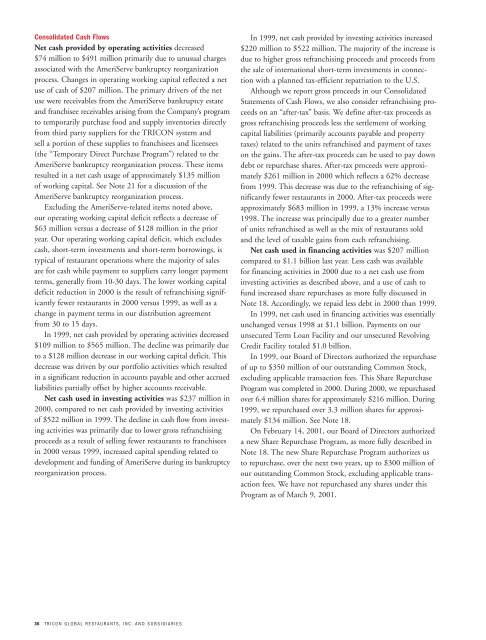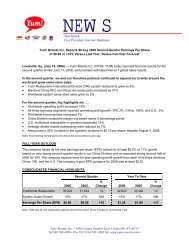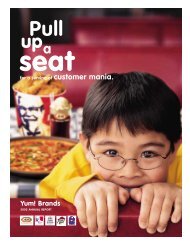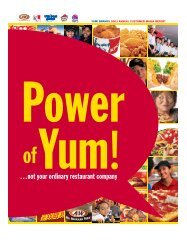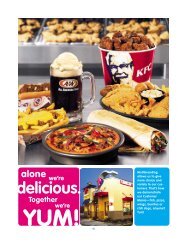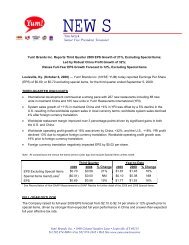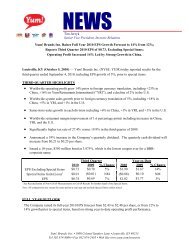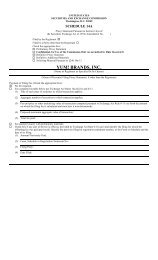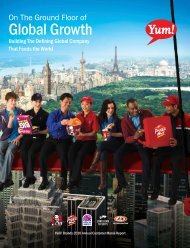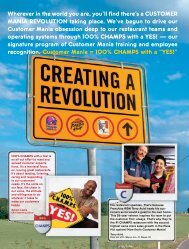2000 Annual Report - Yum!
2000 Annual Report - Yum!
2000 Annual Report - Yum!
Create successful ePaper yourself
Turn your PDF publications into a flip-book with our unique Google optimized e-Paper software.
Consolidated Cash Flows<br />
Net cash provided by operating activities decreased<br />
$74 million to $491 million primarily due to unusual charges<br />
associated with the AmeriServe bankruptcy reorganization<br />
process. Changes in operating working capital reflected a net<br />
use of cash of $207 million. The primary drivers of the net<br />
use were receivables from the AmeriServe bankruptcy estate<br />
and franchisee receivables arising from the Company’s program<br />
to temporarily purchase food and supply inventories directly<br />
from third party suppliers for the TRICON system and<br />
sell a portion of these supplies to franchisees and licensees<br />
(the “Temporary Direct Purchase Program”) related to the<br />
AmeriServe bankruptcy reorganization process. These items<br />
resulted in a net cash usage of approximately $135 million<br />
of working capital. See Note 21 for a discussion of the<br />
AmeriServe bankruptcy reorganization process.<br />
Excluding the AmeriServe-related items noted above,<br />
our operating working capital deficit reflects a decrease of<br />
$63 million versus a decrease of $128 million in the prior<br />
year. Our operating working capital deficit, which excludes<br />
cash, short-term investments and short-term borrowings, is<br />
typical of restaurant operations where the majority of sales<br />
are for cash while payment to suppliers carry longer payment<br />
terms, generally from 10-30 days. The lower working capital<br />
deficit reduction in <strong>2000</strong> is the result of refranchising significantly<br />
fewer restaurants in <strong>2000</strong> versus 1999, as well as a<br />
change in payment terms in our distribution agreement<br />
from 30 to 15 days.<br />
In 1999, net cash provided by operating activities decreased<br />
$109 million to $565 million. The decline was primarily due<br />
to a $128 million decrease in our working capital deficit. This<br />
decrease was driven by our portfolio activities which resulted<br />
in a significant reduction in accounts payable and other accrued<br />
liabilities partially offset by higher accounts receivable.<br />
Net cash used in investing activities was $237 million in<br />
<strong>2000</strong>, compared to net cash provided by investing activities<br />
of $522 million in 1999. The decline in cash flow from investing<br />
activities was primarily due to lower gross refranchising<br />
proceeds as a result of selling fewer restaurants to franchisees<br />
in <strong>2000</strong> versus 1999, increased capital spending related to<br />
development and funding of AmeriServe during its bankruptcy<br />
reorganization process.<br />
36 TRICON GLOBAL RESTAURANTS, INC. AND SUBSIDIARIES<br />
In 1999, net cash provided by investing activities increased<br />
$220 million to $522 million. The majority of the increase is<br />
due to higher gross refranchising proceeds and proceeds from<br />
the sale of international short-term investments in connection<br />
with a planned tax-efficient repatriation to the U.S.<br />
Although we report gross proceeds in our Consolidated<br />
Statements of Cash Flows, we also consider refranchising proceeds<br />
on an “after-tax” basis. We define after-tax proceeds as<br />
gross refranchising proceeds less the settlement of working<br />
capital liabilities (primarily accounts payable and property<br />
taxes) related to the units refranchised and payment of taxes<br />
on the gains. The after-tax proceeds can be used to pay down<br />
debt or repurchase shares. After-tax proceeds were approximately<br />
$261 million in <strong>2000</strong> which reflects a 62% decrease<br />
from 1999. This decrease was due to the refranchising of significantly<br />
fewer restaurants in <strong>2000</strong>. After-tax proceeds were<br />
approximately $683 million in 1999, a 13% increase versus<br />
1998. The increase was principally due to a greater number<br />
of units refranchised as well as the mix of restaurants sold<br />
and the level of taxable gains from each refranchising.<br />
Net cash used in financing activities was $207 million<br />
compared to $1.1 billion last year. Less cash was available<br />
for financing activities in <strong>2000</strong> due to a net cash use from<br />
investing activities as described above, and a use of cash to<br />
fund increased share repurchases as more fully discussed in<br />
Note 18. Accordingly, we repaid less debt in <strong>2000</strong> than 1999.<br />
In 1999, net cash used in financing activities was essentially<br />
unchanged versus 1998 at $1.1 billion. Payments on our<br />
unsecured Term Loan Facility and our unsecured Revolving<br />
Credit Facility totaled $1.0 billion.<br />
In 1999, our Board of Directors authorized the repurchase<br />
of up to $350 million of our outstanding Common Stock,<br />
excluding applicable transaction fees. This Share Repurchase<br />
Program was completed in <strong>2000</strong>. During <strong>2000</strong>, we repurchased<br />
over 6.4 million shares for approximately $216 million. During<br />
1999, we repurchased over 3.3 million shares for approximately<br />
$134 million. See Note 18.<br />
On February 14, 2001, our Board of Directors authorized<br />
a new Share Repurchase Program, as more fully described in<br />
Note 18. The new Share Repurchase Program authorizes us<br />
to repurchase, over the next two years, up to $300 million of<br />
our outstanding Common Stock, excluding applicable transaction<br />
fees. We have not repurchased any shares under this<br />
Program as of March 9, 2001.


